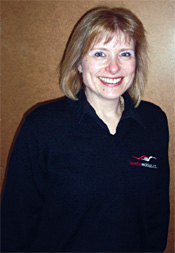
 |
 |
| Sohail Ratansi, managing director, Fones U Like |
 |
| Chris Mayers, managing director, Border Mobiles |
Each month the IMPDA asks a panel of dealers how they feel about the hottest topics affecting the channel community. This month, we are looking fi rstly at disability. In 1996 and 1997 it was reported that there were over 8.6 million disabled people in the UK. Today that fi gure is much greater, but there are very few mobiles designed for the disabled that can be found online, and an absence of specifically designed mobiles in many shops. Should the major manufacturers and dealers now look to offering this sector of the market a mobile which will suit their needs or is this group largely ignored because it would not be profi table for the manufacturers?
Chris Mayers, managing director, Border Mobiles:
Mobiles fi rst started in April 2004. It is based in the small town of Hawick on the border of Scotland and England. It is a small family fi rm supplying mobiles via its website and from out of its own shop: Many people within the UK who are registered as disabled are more than capable of using many of the mobiles on the market today. However I do think there is a general lack of an easy to use large button mobile with emergency feature that is reasonably priced and easily accessible.
I feel that mobile manufacturers are concentrating on the younger generation and forgetting about those who just want to be able to make emergency calls or texts, not necessarily the just the disabled but the technophobes too!
I feel there is a market for a mobile that would suit partially sighted, hard of hearing, and elderly, a device that could combine features to suit all categories. There are a few out there but these tend to be either diffi cult to source or are too expensive for the user, having features that are not necessary for that segment.
Customers want a known make, and a back to basics handset in my opinion would be a popular choice for many. I feel with the advancement of technology, manufacturers are scared to produce such an item. Instead they want a cutting edge range of handsets, and they want their handset to be used to the maximum.
This is a desire backed up by the networks, as networks do not want an item to be used once every blue moon. A phone made specifi cally for the registered disabled market item is non profi table for network operators and decreases average call spend per user on the network.
Ultimately it will be down to support groups to get the backing of a handset manufacturer to produce the item most suited to an individual group, but it would be nice to see such a device more widely available.
Darren Griffi ths, managing director, High Peak Mobiles:
High Peak Mobiles is based in the heart of the Peak District - Chapel-en-le-Frith. It offers mobile related goods and services online. All goods and services are despatched from its suppliers directly to customers: The 2008 Summer Olympics now seems as though it happened in the dim and distant past. The Games were an outstanding success and the TV coverage monopolised our widescreens for many hours in every household.
Then came the Paralympics….remember? You may not, as the TV coverage
was limited and although these people deserve the same applause for the amazing effort they put in, media tends to give them poor ‘nobody’s watching slot’. I am sure that you all think this is wrong and that they deserve better, but we all hold that guilt, and when it comes to supplying mobile phones to individuals with a disability we fail also, as do the major mobile phone distributors.
If we look at the stats, people with disabilities make up a huge proportion of our population so why do we not see special designs in the shops or online?
I understand that a disability can take on many forms and while it may be diffi cult to cater for all, maybe (if not defi nitely!) we should at least have an option in our wide range of handsets.
Sohail Ratansi, director, Fones U Like:
Sohail has been involved in telecoms since 1996, from a retail job to Cable & Wireless to a break in banking, then back to the mobile industry. He set up Fones U Like in 2006, starting in consumer, and moving into B2B. Now, 95% of the company’s business is B2B: Mobile phone usage has increased exponentially in the last few years as evident of all the retailers one sees in the high street. Historically the fi ve key on phone keypads is usually raised which aids the visually impaired. Nokia Symbian handsets also have a message reading facility which I know is used by people with impaired sight. There also used to be some kind of hands free solution for those using hearing aids.
Can more be done? Maybe, but is it good business sense to specialise in this? I’m not too sure. I believe to have special handsets for the blind or deaf or with a mobility disability, although a very good line to produce, might not have the desired effect. Reasons range from stigma to too many areas to concentrate on.
Maybe some more apps on the current range of handsets to improve usage may be a better alternative, as the cost of producing handsets for just disabled users may be also be off putting. For example, there could be a facility so that when a text message comes in, the user can actually have the mobile speak the text message to them. Additionally, they could record a text message to send as well. The technology is around to do that, but it would take a manufacturer to ensure that this was standard on every mobile they produce, yet the cost of doing so may be prohibitive.
With today’s mobiles now very technical, especially those designed for business, is the time now coming for the addition of an inbuilt scanner, so that your average businessman can scan documents into their mobile unit to then send along with their reports to their offi ce? Many professionals, including loss adjusters and accident insurance inspectors, regularly use their mobiles when carrying out inspections in the fi eld, so it would be useful. Would this facility increase sales and encourage more businesses to take up mobile use in their company?
Griffi ths, High Peak Mobiles:
If you remember the popular science program that ran from 1965 until 2003, called Tomorrows World, then you may also recall shouting at the screen telling them that their futuristic inventions would never see the light of day and that they would never reach mass production status. Back then ideas seemed to take a decade to go from the concept, to the basic design and then the test models. Because of this, they even had time to make a program about them!
Of course many ideas were crazy and many did fail but the point is that they all took time to develop due to limitations with technology. Nowadays though, an idea can be in full production before you have had time to fi nish reading this publication, which brings me onto the question of the ‘mobile phone scanner’. I am sure that this will have some uses for certain companies but is it really needed? Having the ability to email pdf’s and images is more than adequate for most. Our phones already have so much capability that with the current smartphones we can produce any offi ce document and email it from where ever we may be. In fact, having thought of all the tasks I do during the course of a day I cannot ever remember thinking that scanning a document with a mobile would be so handy. Can You? So maybe this gadget should be left at the concept stage in ‘Yesterdays World’.
Ratansi, Fones U Like:
Getting handsets to do too much can be a real situation of jack of all trades, master of none, like the buggy Nokia N95 or the Sony Ericsson p990i. That aside, there is scope to develop functions like scanners, especially with HSDPA being a standard feature on many handsets and data usage also on the increase, with data a lot cheaper than before.
I think the potential is there but needs to be mastered. There can be too much on handsets, and the danger is that people will get confused if too many applications are crammed onto one handset. In the meantime, a lot of master of none’s will be all over the place. ...ala Nokia N96.
Many reps and agents now carry additional equipment in their cards which can easily be plugged into the mobile. I think that the time is not yet right for such additions to the handset range, but this may change in the future. However, with technology moving at a great pace these days, it would not be surprising to see this feature appear on handsets in the future.
It is a question of affordability, as well as the question of is it really needed. At the moment I think the answer is no, it’s not required. Like a lot of applications on mobiles today, many are not used to their full extent by companies, and even less so by the consumer, so I don’t think an inbuilt scanner would be of any use to business at this time.
The IMPDA (Independent Mobile Phone Dealers Association) is open to all UK dealers and distributors. The aim of the IMPDA is to achieve a level playing fi eld for its members, and to champion quality improvements in the industry for a better future. If you would like to join the IMPDA then simply email membership@impda.co.uk. If you have a concern or story then either email admin@ impda.co.uk or call 0844 884 9702.
